小学英语教师自培计划
2024年小学英语教师培训计划书(3篇)

2024年小学英语教师培训计划书一、培训目的英语教学的目的是激发学生学习兴趣、培养积极态度、使学生建立初步的自信心,培养一定的语感和良好的语音、语调基础,初步形成用英语进行日常交流的能力,为进一步学习打下良好的基础。
因此,口语在英语教学中极为重要。
为适应新课程改革的需要和快速发展的英语教学需求,切实提高我县英语教师口语水平,特开展全县中小学英语教师口语培训活动。
二、培训对象全县初中、小学现任英语教师。
三、培训内容英语语音知识;常用英语课堂用语;英语简单会话及日常生活用语等。
四、培训日程____年____月____日、____日两天(农历正月十二、十三)。
五、培训地点县职业中专报告厅。
五、培训模式1.集中培训学习英语语音知识,英语课堂用语、英语简单会话及日常生活用语。
和学员一起回顾自己在教学过程中遇到的口语语音方面的典型问题,请全体教师共同商讨解决办法,并分享个人的成功经验。
____口语交流全体学员进行英语口语交流。
唱英文歌曲、讲英语故事,或讲述自己的兴趣爱好,家庭情况等。
3.自行练习现场进行语音、语调的纠正,要求学员在日常交流工作中坚持多用英语,努力提高自身的语言技能。
2024年小学英语教师培训计划书(2)尊敬的教育局领导:我谨提出2024年小学英语教师培训计划书,希望能够提高小学英语教师的教学能力和专业素养,为学生提供更好的英语教育服务。
一、培训目标1. 提高教师对英语教学理念的认识和理解,使其能够灵活运用不同的教学方法和策略,满足学生的不同学习需求;2. 培养教师的教学创新能力,鼓励他们积极尝试新的教学方式和教学工具,提升教学效果;3. 加强教师的教育技能,提高他们的语言能力和口语表达能力,提供更优质的英语学习环境;4. 培养教师的教育观念和教育情怀,使他们能够关注学生的全面发展,培养学生良好的学习习惯和学习动力。
二、培训内容1. 理论学习:为教师提供专业的英语教学理论知识,包括教学方法、教学策略、课堂管理等方面的内容。
教师年度个人自培计划(5篇)
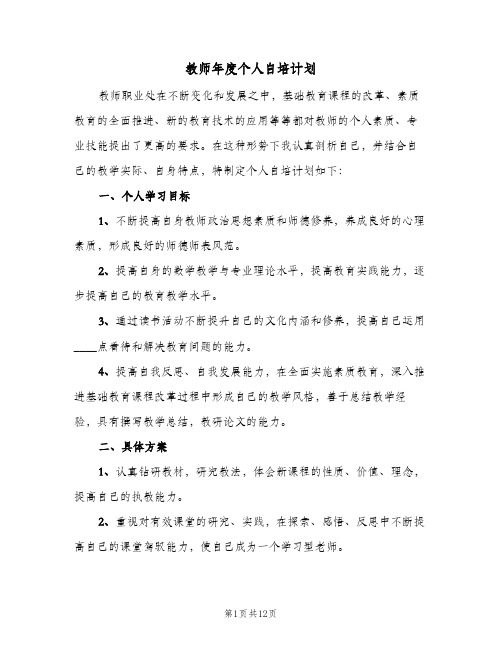
教师年度个人自培计划教师职业处在不断变化和发展之中,基础教育课程的改革、素质教育的全面推进、新的教育技术的应用等等都对教师的个人素质、专业技能提出了更高的要求。
在这种形势下我认真剖析自己,并结合自己的教学实际、自身特点,特制定个人自培计划如下:一、个人学习目标1、不断提高自身教师政治思想素质和师德修养,养成良好的心理素质,形成良好的师德师表风范。
2、提高自身的数学教学与专业理论水平,提高教育实践能力,逐步提高自己的教育教学水平。
3、通过读书活动不断提升自己的文化内涵和修养,提高自己运用____点看待和解决教育问题的能力。
4、提高自我反思、自我发展能力,在全面实施素质教育,深入推进基础教育课程改革过程中形成自己的教学风格,善于总结教学经验,具有撰写教学总结,教研论文的能力。
二、具体方案1、认真钻研教材,研究教法,体会新课程的性质、价值、理念,提高自己的执教能力。
2、重视对有效课堂的研究、实践,在探索、感悟、反思中不断提高自己的课堂驾驭能力,使自己成为一个学习型老师。
3.坚持个人理论学习制度,不断提高自己的理论水平。
每天不管再忙也要抽出半个小时来阅读自己本年度计划要阅读的相关书籍,开阔自己的眼界,丰富自己的知识结构,不断提高自己的专业知识,同时进行有价值的摘抄,用于教育教学实践。
4.充分发挥网上资源共享的优势,积极上教育类网站,汲取先进的教育教学理论,吸收成功的教育教学经验,探讨教育教学工作中的得与失,从而快速提高自己的教育教学水平。
5、积极与同学科的教师相互交流,团结协作,共同发展。
6、结合学校的业务学习计划,积极探索“导学-自学-互学”课堂教改模式,努力形成自己的教学模式,提高教学效果。
教师年度个人自培计划(二)作为一个新教师、一名年轻教师,幸运的是拥有和孩子们共同成长的机会,要当好一个老师,我觉得要坚信:爱能融化一切,爱能创造一切,有爱就有一切。
一、自我剖析(一)优势分析1.作为新教师、年青人,我有着充沛的精力和灵活的头脑,对不断完善、更新的教育理念有着较强的适应能力。
小学英语国培个人工作计划

一、前言作为一名小学英语教师,我深知在当前教育改革的大背景下,提升自身的专业素养和教学能力至关重要。
为了更好地适应教育发展的需要,提高教育教学质量,我决定参加国家培训计划(以下简称“国培计划”)。
以下是我参加国培计划的个人工作计划。
二、培训目标1. 提升英语教学理论水平,掌握先进的教学理念和教学方法。
2. 深入了解英语课程标准和教材,提高对教材的把握能力。
3. 提高英语课堂教学能力,提升学生的英语听说读写能力。
4. 学习教育评价方法,提高教学质量监控和改进能力。
5. 培养团队合作精神,提高与同事、家长沟通协作能力。
三、培训内容1. 英语教学理论:深入学习英语教学法、课程设计、教学评价等理论知识。
2. 教材分析:深入研究人教版、牛津版等小学英语教材,掌握教材特点及教学策略。
3. 教学技能:学习英语课堂组织、教学活动设计、多媒体教学等技能。
4. 教育评价:学习教学评价方法,提高教学质量监控和改进能力。
5. 教育科研:学习教育科研方法,提高教育科研能力。
四、实施步骤1. 第一阶段(1-2个月):参加国培计划开班仪式,了解培训课程安排,明确培训目标。
参加英语教学理论、教材分析等课程,掌握相关理论知识。
2. 第二阶段(3-4个月):参加教学技能、教育评价等课程,学习课堂教学技巧和评价方法。
结合实际教学,尝试运用所学知识和技能。
3. 第三阶段(5-6个月):参加教育科研课程,学习教育科研方法。
开展课题研究,撰写研究报告。
4. 第四阶段(7-8个月):总结培训成果,撰写个人培训总结。
将所学知识、技能应用于实际教学,提高教育教学质量。
五、预期成果1. 提高自身英语教学理论水平和课堂教学能力。
2. 掌握教材特点和教学策略,提高教学质量。
3. 培养学生的英语听说读写能力,提高学生的英语素养。
4. 提高教育评价能力,为教学改进提供依据。
5. 增强团队合作精神,提高与同事、家长沟通协作能力。
六、总结通过参加国培计划,我将努力提升自身专业素养和教学能力,为我国小学英语教育事业贡献自己的力量。
英语教师校本培训自培计划
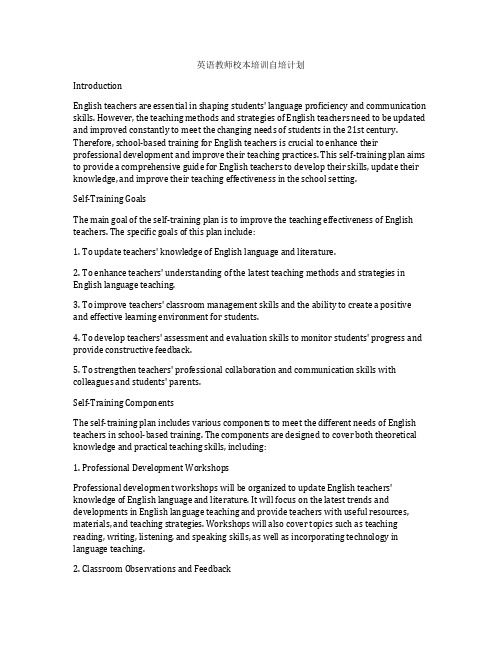
英语教师校本培训自培计划IntroductionEnglish teachers are essential in shaping students' language proficiency and communication skills. However, the teaching methods and strategies of English teachers need to be updated and improved constantly to meet the changing needs of students in the 21st century. Therefore, school-based training for English teachers is crucial to enhance their professional development and improve their teaching practices. This self-training plan aims to provide a comprehensive guide for English teachers to develop their skills, update their knowledge, and improve their teaching effectiveness in the school setting.Self-Training GoalsThe main goal of the self-training plan is to improve the teaching effectiveness of English teachers. The specific goals of this plan include:1. To update teachers' knowledge of English language and literature.2. To enhance teachers' understanding of the latest teaching methods and strategies in English language teaching.3. To improve teachers' classroom management skills and the ability to create a positive and effective learning environment for students.4. To develop teachers' assessment and evaluation skills to monitor students' progress and provide constructive feedback.5. To strengthen teachers' professional collaboration and communication skills with colleagues and students' parents.Self-Training ComponentsThe self-training plan includes various components to meet the different needs of English teachers in school-based training. The components are designed to cover both theoretical knowledge and practical teaching skills, including:1. Professional Development WorkshopsProfessional development workshops will be organized to update English teachers' knowledge of English language and literature. It will focus on the latest trends and developments in English language teaching and provide teachers with useful resources, materials, and teaching strategies. Workshops will also cover topics such as teaching reading, writing, listening, and speaking skills, as well as incorporating technology in language teaching.2. Classroom Observations and FeedbackThis component involves peer observations and feedback to help English teachers improve their teaching practices. Teachers will be paired up to observe each other's classes and provide constructive feedback based on agreed criteria. This will promote self-reflection and continuous improvement in teaching effectiveness.3. Lesson StudyLesson study is an effective professional development activity that involves teachers working collaboratively to plan, teach, observe, and analyze a lesson. This component will allow teachers to exchange ideas, try out new teaching methods, and evaluate the effectiveness of their teaching. It will also encourage teachers to reflect on their practice and make adjustments based on their observations.4. Action ResearchAction research allows teachers to investigate and reflect on their own teaching practices in a systematic way. This component will involve English teachers in identifying a specific teaching problem, conducting research, implementing changes, and evaluating the impact of these changes. Action research will help teachers improve their teaching effectiveness and contribute to the overall improvement of English language teaching in the school.5. Reading and Professional Learning CommunitiesThis component will encourage English teachers to engage in professional reading, discussions, and collaborative learning. Teachers will be encouraged to read professional literature, attend conferences, and participate in online and face-to-face discussions to exchange ideas and share best practices with colleagues.Self-Training ScheduleThe self-training plan will be implemented over the course of one academic year, with ongoing support and follow-up activities to ensure the continuous improvement of English teachers' professional development.Month 1-2: Professional Development Workshops- Organize workshops on the latest trends and developments in English language teaching - Provide resources, materials, and teaching strategies for English language and literature - Develop teachers' understanding of assessment and evaluation of students' language proficiencyMonth 3-4: Classroom Observations and Feedback- Pair up teachers for peer observations of each other's classes- Develop a framework for providing constructive feedback based on agreed criteria- Promote self-reflection and continuous improvement in teaching effectivenessMonth 5-6: Lesson Study- Collaboratively plan, teach, observe, and analyze a lesson with a focus on the integration of reading, writing, listening, and speaking skills- Exchange ideas, try out new teaching methods, and evaluate the effectiveness of teaching practicesMonth 7-8: Action Research- Identify specific teaching problems and conduct research to improve teaching practices- Implement changes based on the findings and evaluate the impact of these changes- Contribute to the overall improvement of English language teaching in the schoolMonth 9-10: Reading and Professional Learning Communities- Engage in professional reading, discussions, and collaborative learning- Participate in conferences, online discussions, and face-to-face meetings to share best practices with colleagues- Exchange ideas and share experiences in professional development activitiesMonth 11-12: Reflection and Follow-Up Activities- Reflect on the overall professional development journey and its impact on teaching practices- Plan for follow-up activities, ongoing support, and further professional development opportunities for English teachersSelf-Training EvaluationAt the end of the self-training plan, English teachers will be evaluated based on their professional development and the impact of their improved teaching practices on students' language proficiency and communication skills. The evaluation will include:1. Pre and post-surveys to measure teachers' knowledge and skills in English language teaching.2. Classroom observations and feedback to assess the impact of professional development activities on teaching practices.3. Student assessments to evaluate the impact of improved teaching practices on students' language proficiency and communication skills.4. Self-reflection and self-assessment by teachers to assess their individual growth and development as a result of the self-training plan.ConclusionThe self-training plan for English teachers is designed to provide a comprehensive guide for professional development and continuous improvement in teaching practices. It aims to enhance the knowledge, skills, and teaching effectiveness of English teachers through a variety of components and activities. By implementing this self-training plan, English teachers will be better equipped to meet the changing needs of students and create a positive and effective learning environment in the school setting.。
小学英语自培计划培训内容
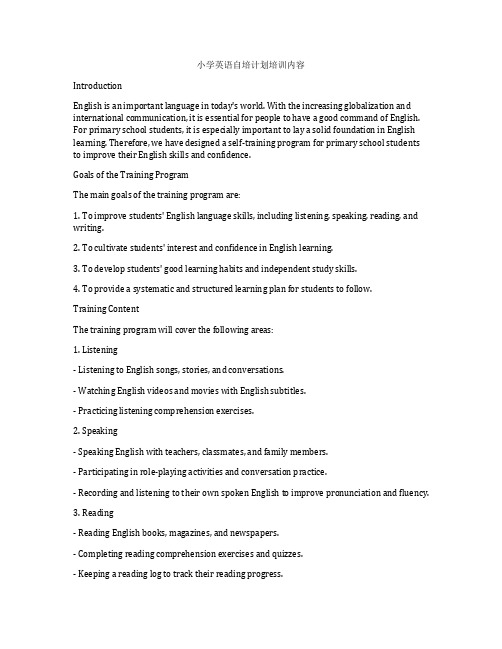
小学英语自培计划培训内容IntroductionEnglish is an important language in today's world. With the increasing globalization and international communication, it is essential for people to have a good command of English. For primary school students, it is especially important to lay a solid foundation in English learning. Therefore, we have designed a self-training program for primary school students to improve their English skills and confidence.Goals of the Training ProgramThe main goals of the training program are:1. To improve students' English language skills, including listening, speaking, reading, and writing.2. To cultivate students' interest and confidence in English learning.3. To develop students' good learning habits and independent study skills.4. To provide a systematic and structured learning plan for students to follow.Training ContentThe training program will cover the following areas:1. Listening- Listening to English songs, stories, and conversations.- Watching English videos and movies with English subtitles.- Practicing listening comprehension exercises.2. Speaking- Speaking English with teachers, classmates, and family members.- Participating in role-playing activities and conversation practice.- Recording and listening to their own spoken English to improve pronunciation and fluency.3. Reading- Reading English books, magazines, and newspapers.- Completing reading comprehension exercises and quizzes.- Keeping a reading log to track their reading progress.4. Writing- Writing short essays, stories, and journal entries in English.- Practicing grammar and vocabulary through writing exercises.- Receiving feedback and corrections on their written work.5. Vocabulary and Grammar- Learning new vocabulary words and phrases through flashcards, games, and activities.- Studying grammar rules and applying them in writing and speaking.- Taking regular quizzes and tests to assess their understanding.Training MethodsThe training program will utilize various methods to engage students and provide them with a well-rounded learning experience. These methods include:- Interactive activities and games to make learning fun and engaging.- Out-of-classroom activities such as field trips, language clubs, and study tours.- Regular assessments and feedback to monitor students' progress and provide guidance for improvement.- Use of technology, such as educational apps and online resources, to enhance learning. Training ScheduleThe training schedule will be designed to suit the students' school timetable and extracurricular activities. It will include regular sessions for each area of learning, as well as special events and workshops. The schedule will be flexible to accommodate students' individual needs and preferences.Monitoring and EvaluationThe progress of each student will be monitored and evaluated regularly through assessments, quizzes, and feedback from teachers and parents. This will help to identify areas for improvement and provide targeted support for each student.ConclusionThe primary English self-training program aims to provide students with a structured and effective way to improve their English language skills. By following the training content and methods, students can develop a strong foundation in English and build confidence in their ability to communicate in the language. With the support of teachers, parents, and peers, students will be able to achieve their goals and become proficient English speakers.。
小学英语教师自我培训计划
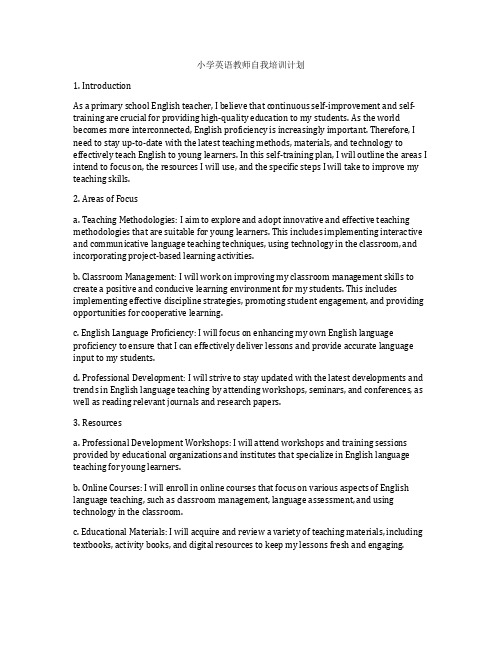
小学英语教师自我培训计划1. IntroductionAs a primary school English teacher, I believe that continuous self-improvement and self-training are crucial for providing high-quality education to my students. As the world becomes more interconnected, English proficiency is increasingly important. Therefore, I need to stay up-to-date with the latest teaching methods, materials, and technology to effectively teach English to young learners. In this self-training plan, I will outline the areas I intend to focus on, the resources I will use, and the specific steps I will take to improve my teaching skills.2. Areas of Focusa. Teaching Methodologies: I aim to explore and adopt innovative and effective teaching methodologies that are suitable for young learners. This includes implementing interactive and communicative language teaching techniques, using technology in the classroom, and incorporating project-based learning activities.b. Classroom Management: I will work on improving my classroom management skills to create a positive and conducive learning environment for my students. This includes implementing effective discipline strategies, promoting student engagement, and providing opportunities for cooperative learning.c. English Language Proficiency: I will focus on enhancing my own English language proficiency to ensure that I can effectively deliver lessons and provide accurate language input to my students.d. Professional Development: I will strive to stay updated with the latest developments and trends in English language teaching by attending workshops, seminars, and conferences, as well as reading relevant journals and research papers.3. Resourcesa. Professional Development Workshops: I will attend workshops and training sessions provided by educational organizations and institutes that specialize in English language teaching for young learners.b. Online Courses: I will enroll in online courses that focus on various aspects of English language teaching, such as classroom management, language assessment, and using technology in the classroom.c. Educational Materials: I will acquire and review a variety of teaching materials, including textbooks, activity books, and digital resources to keep my lessons fresh and engaging.d. Peer Support: I will seek mentorship and advice from experienced colleagues and participate in peer observation and feedback sessions to learn from their experiences and expertise.4. Specific Stepsa. Attend a Workshop on Interactive Teaching Techniques: I will register for a workshop that focuses on interactive teaching techniques, such as role-plays, games, and storytelling, to make language learning more engaging for my students.b. Enroll in an Online Course on Classroom Management: I will enroll in an online course that provides strategies and techniques for effective classroom management, such as promoting positive behavior, managing group work, and handling classroom disruptions.c. Join a Professional Development Network: I will join a professional development network for English language teachers to connect with other educators, share resources, and discuss best practices in teaching English to young learners.d. Develop and Pilot a Project-Based Learning Activity: I will design a project-based learning activity for my students, pilot it in my classroom, and evaluate its effectiveness in promoting language acquisition and student engagement.5. Timelinea. Month 1-2: Attend workshop on interactive teaching techniques and start implementing them in the classroom.b. Month 3-4: Enroll in online course on classroom management and apply the strategies learned in the classroom.c. Month 5-6: Join a professional development network and start collaborating with other English language teachers to share resources and ideas.d. Month 7-8: Design and pilot a project-based learning activity in the classroom and evaluate its impact on student learning.6. EvaluationAt the end of the self-training period, I will evaluate the effectiveness of the steps taken and the impact on my teaching practice. I will solicit feedback from students, colleagues, and supervisors to assess the success of the self-training plan. I will also reflect on my own experiences and observations to determine the areas in which I have grown and identify areas for further improvement.In conclusion, this self-training plan is designed to enhance my teaching skills and ensure that I am equipped to provide high-quality English language instruction to young learners. By focusing on teaching methodologies, classroom management, language proficiency, and professional development, I aim to become a more effective and competent Englishlanguage teacher. I am committed to continuous self-improvement and look forward to implementing the strategies outlined in this plan to benefit my students and contribute to their language learning journey.。
小学英语老师个人培训计划
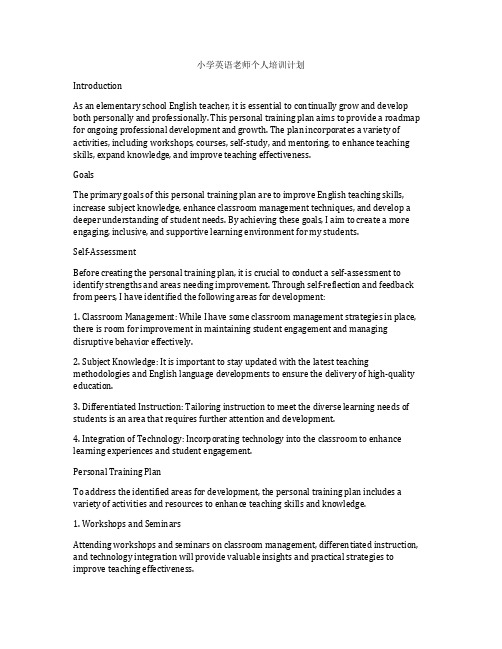
小学英语老师个人培训计划IntroductionAs an elementary school English teacher, it is essential to continually grow and develop both personally and professionally. This personal training plan aims to provide a roadmap for ongoing professional development and growth. The plan incorporates a variety of activities, including workshops, courses, self-study, and mentoring, to enhance teaching skills, expand knowledge, and improve teaching effectiveness.GoalsThe primary goals of this personal training plan are to improve English teaching skills, increase subject knowledge, enhance classroom management techniques, and develop a deeper understanding of student needs. By achieving these goals, I aim to create a more engaging, inclusive, and supportive learning environment for my students.Self-AssessmentBefore creating the personal training plan, it is crucial to conduct a self-assessment to identify strengths and areas needing improvement. Through self-reflection and feedback from peers, I have identified the following areas for development:1. Classroom Management: While I have some classroom management strategies in place, there is room for improvement in maintaining student engagement and managing disruptive behavior effectively.2. Subject Knowledge: It is important to stay updated with the latest teaching methodologies and English language developments to ensure the delivery of high-quality education.3. Differentiated Instruction: Tailoring instruction to meet the diverse learning needs of students is an area that requires further attention and development.4. Integration of Technology: Incorporating technology into the classroom to enhance learning experiences and student engagement.Personal Training PlanTo address the identified areas for development, the personal training plan includes a variety of activities and resources to enhance teaching skills and knowledge.1. Workshops and SeminarsAttending workshops and seminars on classroom management, differentiated instruction, and technology integration will provide valuable insights and practical strategies to improve teaching effectiveness.2. Online CoursesEnrolling in online courses related to language teaching, curriculum development, and educational technology will enhance subject knowledge and teaching skills. Courses such as "Teaching English to Young Learners" and "Using Technology in the Classroom" will be beneficial for professional growth.3. Self-StudyRegular reading of educational journals, books, and articles on language teaching, classroom management, and student engagement will provide new perspectives and ideas for practice. Self-study also includes reflecting on teaching practices and seeking feedback from colleagues to identify areas for improvement.4. MentoringEngaging in mentoring relationships with experienced teachers will provide opportunities to receive guidance, support, and constructive feedback on teaching practices. Mentoring can help in developing effective classroom management techniques and differentiated instruction strategies.5. Peer Observation and FeedbackParticipating in peer observation and feedback sessions with colleagues will provide valuable insights into teaching practices and opportunities for sharing best practices. Observing other teachers and receiving feedback on teaching practices will help in refining teaching strategies.Progress Monitoring and EvaluationTo monitor progress and evaluate the effectiveness of the personal training plan, regular self-assessment and feedback from colleagues and students will be essential. This will involve collecting student feedback on teaching practices, reflecting on the implementation of new strategies, and analyzing student outcomes.TimelineThe personal training plan will be implemented over the course of one year, with specific timelines for each activity:- Workshops and Seminars: Attend at least two workshops or seminars on classroom management, differentiated instruction, and technology integration within the first six months.- Online Courses: Enroll in two online courses related to language teaching and educational technology within the first six months.- Self-Study: Engage in regular self-study and reflection on teaching practices throughout the year.- Mentoring: Establish a mentoring relationship with an experienced teacher within the first three months and meet regularly for guidance and support.- Peer Observation and Feedback: Participate in peer observation and feedback sessions at least twice a semester.ConclusionBy systematically implementing the personal training plan, I aim to enhance my teaching skills, expand subject knowledge, and improve classroom management techniques. Through ongoing professional development, I am committed to creating a more engaging, inclusive, and supportive learning environment for my students, ultimately contributing to their academic success and personal growth.。
2024年小学英语教师自培计划(3篇)
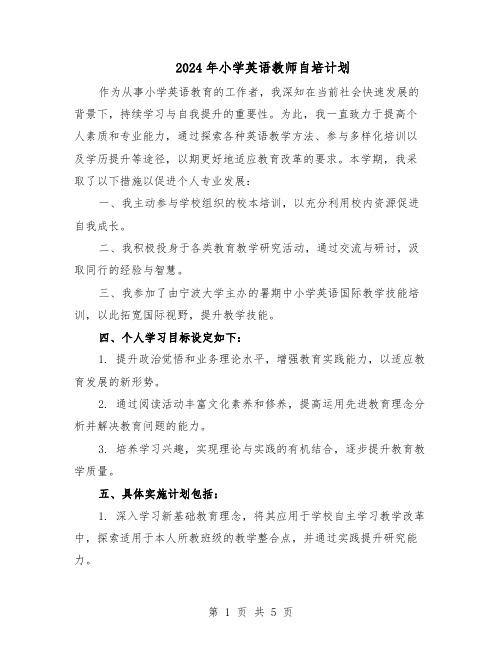
2024年小学英语教师自培计划作为从事小学英语教育的工作者,我深知在当前社会快速发展的背景下,持续学习与自我提升的重要性。
为此,我一直致力于提高个人素质和专业能力,通过探索各种英语教学方法、参与多样化培训以及学历提升等途径,以期更好地适应教育改革的要求。
本学期,我采取了以下措施以促进个人专业发展:一、我主动参与学校组织的校本培训,以充分利用校内资源促进自我成长。
二、我积极投身于各类教育教学研究活动,通过交流与研讨,汲取同行的经验与智慧。
三、我参加了由宁波大学主办的暑期中小学英语国际教学技能培训,以此拓宽国际视野,提升教学技能。
四、个人学习目标设定如下:1. 提升政治觉悟和业务理论水平,增强教育实践能力,以适应教育发展的新形势。
2. 通过阅读活动丰富文化素养和修养,提高运用先进教育理念分析并解决教育问题的能力。
3. 培养学习兴趣,实现理论与实践的有机结合,逐步提升教育教学质量。
五、具体实施计划包括:1. 深入学习新基础教育理念,将其应用于学校自主学习教学改革中,探索适用于本人所教班级的教学整合点,并通过实践提升研究能力。
2. 面向全体学生,采用启发式、探索式和讨论式教学方法,引导学生主动学习,营造民主和谐的课堂氛围,使学生成为学习的主人。
3. 实施因材施教,注重教学的有效性,关注知识的发展过程,提升课堂互动质量,同时进行教学反思,及时调整和改进教学方法。
4. 学习身边同事的教育教学经验与技巧,不断提高自身教学水平。
5. 倾听学生意见,关注学生成长,采取激励措施,以宽容的心态对待学生,及时与学生沟通,协助学生克服学习困难。
我还将结合学校发展规划,坚持以学校为基础,积极参与生命教育课题研究,投身校本研修,为学校的教育发展和提升贡献力量。
2024年小学英语教师自培计划(二)随着新年的钟声响起,我对于新的一年中的教学工作,已经制定了详细的计划与目标。
在近期个人发展规划方面,我的计划包括以下几点:1. 深入研究新的教材内容,探索教学方法,深刻理解新课程的性质、价值与理念,从而提升个人的教学能力。
- 1、下载文档前请自行甄别文档内容的完整性,平台不提供额外的编辑、内容补充、找答案等附加服务。
- 2、"仅部分预览"的文档,不可在线预览部分如存在完整性等问题,可反馈申请退款(可完整预览的文档不适用该条件!)。
- 3、如文档侵犯您的权益,请联系客服反馈,我们会尽快为您处理(人工客服工作时间:9:00-18:30)。
小学英语教师自培计划
小学英语教师自培计划(一)
作为一名小学英语教师,我个人认为只有不断的学习才能适应这个迅速发展的社会,所以平时我十分注重自身素质的提高,学习一些英语的教学方法、参加各种培训和学历进修。
为了提高自身的教学能力和基本素质,在本学期,我对自己进行了如下的学习和进修。
一、积极参加校本培训。
二、积极参加各类教研活动。
三、积极参加暑期宁波大学组织的中小学英语国际教学技能培训。
四、个人学习目标
1、提高自身的政治、业务理论水平,提高教育实践能力,以适应形势的发展。
2、通过读书活动不断提升自己的文化内涵和修养,提高自己运用科学发展观点看待和解决教育问题的能力。
3、培养提高自身学习的兴趣是理论与实践相结合,逐步提高自己的教育教学水平。
五、具体方案
1.继续学习新基础教育理念,应用于我校的自主性学习教改中,摸索适用于我所带班级的整合点,通过多看、多学、多听、多做来提高自己的钻研能力。
2.在教学中应面向全体学生,实施启发、探索和讨论式
教学,指导学生主动学习,尊重和保护学生的学习自主性和积极性。
在课堂上营造民主和谐的氛围,让孩子真正成为学习的主人。
3.教学中要因材施教,有的放矢,不盲目追求形式,注重知识产生发展过程,提高生生互动、师生互动的有效性。
在还给课堂生命气息的同时努力提高课堂效益。
同时,注重知识的积累,做好实践反思本的撰写,及时总结反思每堂课的优缺点,及时加以调整及改进。
4.向身边的每一位老师学习,学习他们的经验和教学技巧。
5.倾听学生的心声,关注每个孩子的成长。
采用激励的策略,以一颗宽容的心对待班级中的点点滴滴。
及时与学生进行交流与沟通,帮助学生找出数学薄弱的原因。
同时,我还将结合学校发展规划,坚持以校为本,积极投入生命教育课题研究,踊跃参加校本研修,尽我所能,成就自我,为学校的发展做出贡献。
小学英语教师自培计划(二)
新的一年到来了在新的一年里我对自己的教学有以下计划。
一、近期个人发展目标。
1、认真钻研新教材,研究教法,体会新课程的性质、价值、理念,提高自己的执教能力。
2、继续探索生活化、情境化的创设方法,掌握生活化、情境化的课堂风格。
3、重视对有效课堂的研究、实践,在探索、感悟、反思中不断提高自己的课堂驾驭能力,使自己成为一个学习型老师。
4、加强基本功的训练,在钢笔字、粉笔字、普通话、写作的基本功方面都有较大的提高。
5、利用现代化设备,借鉴网络资源,加强对教材体系的梳理,多看名师课堂实录,取他人之长,补已之短。
二、长期个人发展目标
1、养成了良好的阅读习惯,并能有自己的阅读心得或是教育随笔、论文等在市或市级以上教育期刊发表。
2、树立了终生学习的观念,在不断的综合学习中提升了自己的科学素养,成为了一个有内涵的教师。
3、关注高效课堂的研究和实践,并能成为有一定个性的县内或市内知名教师,成为学生喜欢、家长放心、领导省心的教师。
4、锻炼好自己,让自己的专业知识、基本功以及做人都达到一个全新的高度,做一个真正的教育者。
三、为实现以上目标我准备采取以下措施:
1、加强师德师风的修养,形成高尚的人格,有一颗进取的心。
要热爱学生,对学生有博爱之心,要以诚相待,要宽容和有强烈的责任感。
2、树立终身学习的理念。
教师终身学习应具备五种能力:学习能力、教育科研能力、适应现代教学能力、研究学生能力、自我调控能力,今后我要在这些方面多下功夫。
3、更新教育观念,不断学习与反思,勤动笔,勤动脑。
不光认真钻研本学科知识,同时不断拓宽自己的知识视野,增加自身的知识含量。
这其中最重要的一点就是必须持之以恒。
4、做一个勇于课堂实践的老师。
认认真真地上好每一节课,不仅是学生的需要,也不教育发展的最终目标。
发展教育就是要让老师的发展带动学生的发展。
做一个科研型的教师,不断地实践、探索、总结自己的教育行为,必将把自己打造成一个科研型的教师、学者型的教师。
小学英语教师自培计划(三)
时间过得飞快,一转眼参加工作已经十八年了, 作为一名老教师,我一直都能保持一种饱满的激情工作。
为了自己更好的工作,并在学习工作中得到成长。
积极参加省、市、县及学区里的教研活动,在教学实施中不断修正自己、完善自己,不断提高教师应具有的素质。
现制订如下计划:
一、努力提高自己的专业素质
首先,在理论学习中成长:
1、主动关心国内外英语教育信息和专业理论。
2、通过多种途径吸取教育学科的新知识、新技能。
3、进一步学习课题,积极参与课题的研究。
其次,在实践中成长:
1、有计划的积极参加各级专业学习培训和教研活动。
积极参加研修班组织的各项活动及培训
2、探索适合农村英语教学的新方法,寻找真实有效的
课堂教学方法。
3、学习在工作中发现问题、反思自己的教学,记录教育教学中的困难及相关资料的收集和反思。
4、认真做好教学和阅读笔记,积累自己一些学习或工作上的经验。
5、认真参加专业学习和讨论,大胆表达自己的见解,在和同行们共同学习和交流中不断提升自己.
二、多学习
1、学习先进的教育教学理论,转变教育教学观念,准确定位自己,用先进的理论充实自己、武装自己、提高自己。
2、学习身边老师的宝贵经验,提高执教学水平,使自己的课堂真正成为生动、高效的课堂,教学上形成自己的独特风格和特色,在教育科研、创新教育教学研究方面有所建树。
3、学习专业知识,用渊博的知识、个性的教学风格吸引学生,用真诚的态度吸引家长,让自己尽快成长为学生满意、学校信赖的合格教师。
4、不断优化自己的口语,多听英语磁带,多看英语频道的节目.
三、多反思
1、自我反思是提高业务水平的重要途径,对自己的教学行为、学生的活动方式、教学目标的制定、教学内容的选择及时进行反思、总结、改进,向教研型的教师转型。
不断进行师德自查,反省自己的行为,规范自己的言行,做到身
正为师,学高为范。
2、在自己的教学过程中,时刻做到三个反思:教学前反思,从培养学生实践能力着手,拓展教学内容,优化教学过程;教学中反思,及时自动地在行动中反思,培养反思和自我监控地习惯;教学后反思,随时审视,随时修正,形成自己的教学个性。
四、多实践
1、努力探索、大胆实践,用新的教学艺术充实课堂教学。
2、积薄发、开拓创新,做教育教学的研究者。
积极参加各类的教育教学活动,提高自己的理论水平,不断的磨练自己,在挫折中不断的成长完善,结合教学实践实现创新和开拓,实现模式化向个性化的转变。
3、整合资源、为我所用,在课堂教学方面形成自己的特色。
充分利用发达的资讯和媒体手段,观摩名家教学,撰写读书笔记、教学反思,在课堂教学中利用电教多媒体手段立体展示教学内容,激发学生学习的兴趣,创设情景,授予学生发现问题、分析问题、解决问题的技巧,营造氛围,培养学生终生学习的习惯。
五、多总结
定期对自己的教育教学工作进行总结,通过及时总结,有所沉淀,不断为今后的工作积累。
我始终相信一句话:用心,没有做不好的事!只要我用心,有不足就学习,有困难就探索,我相信自己可以做好每一件事情!
小学英语教师自培计划。
